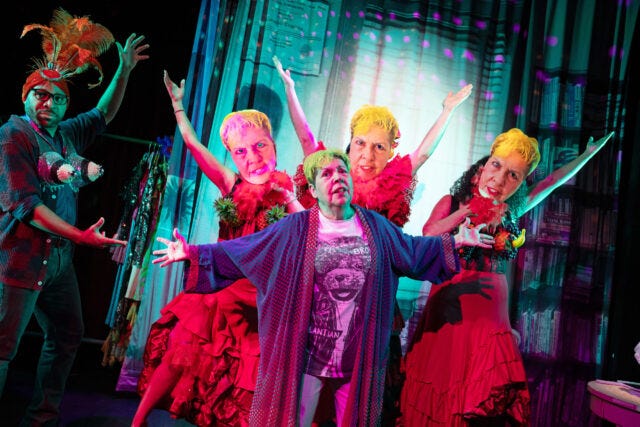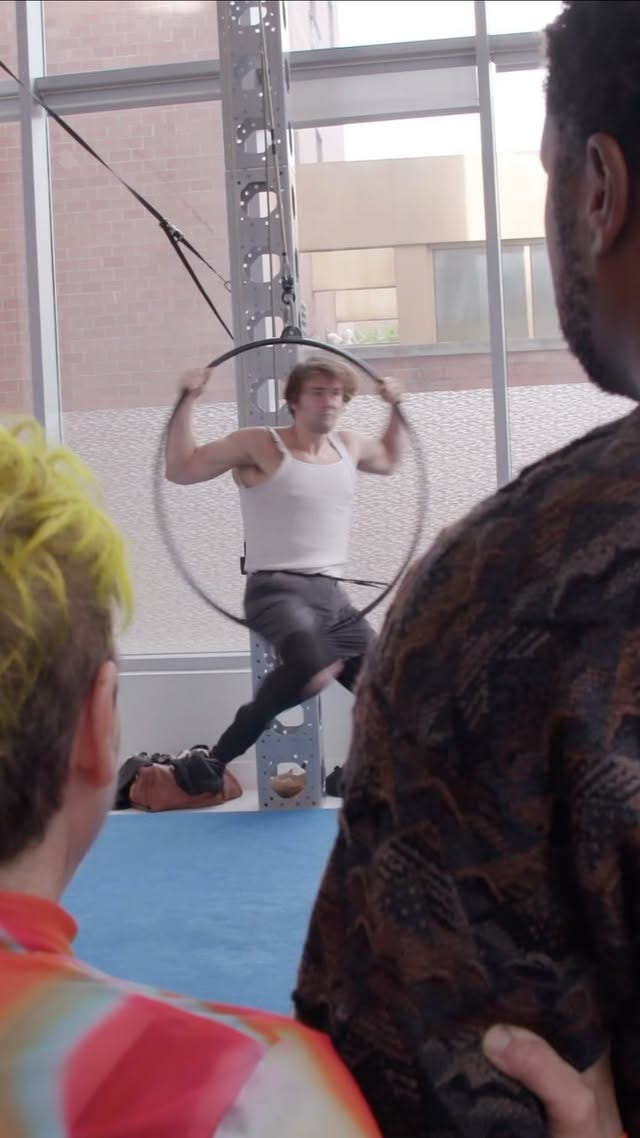somewhere, there’s a place for soho rep: balconies, bathrooms, and the bard
Branden Jacobs-Jenkins (Ugo Chukwu) and Alina Troyano say farewell to a fictional character and a real theater space in Give Me Carmelita Tropicana! at Soho Rep (photo by Julieta Cervantes)
“Parting is such sweet sorrow,” Juliet says to Romeo in what has come to be known as the balcony scene in William Shakespeare’s tragic teen romance.
Is it? Not always. Sometimes, it’s easier to just think, “Good riddance.”
Through December 22, Alina Troyano and Branden Jacobs-Jenkins’s Give Me Carmelita Tropicana! is playing at Soho Rep’s longtime home, the intimate sixty-five-seat walkerspace, at 46 Walker St., where the company has been settled since 1991. However, as a result of the sale of the building during the pandemic, leading to rising rents and repurposing, Soho Rep has to leave; Give Me Carmelita Tropicana! will be its final show there before moving into a two-to-three-year collaboration with Playwrights Horizons on West Forty-Second St.
“It shouldn’t be news to anyone that nonprofit theaters are struggling acutely, and the costs of maintaining a theater company, even at a significantly reduced scale, are skyrocketing,” Playwrights Horizons artistic director Adam Greenfield said in a statement. “New approaches to how theaters work have become a mandate.”
In addition, Guggenheim Fellow and Obie winner Troyano is saying farewell to her beloved character and alter ego, Carmelita Tropicana, a Cuban American spitfire and radical queer feminist she has been portraying since the 1980s. The last performance, called Affinity Night, is a benefit for Soho Rep, with tickets ranging from $1,000 to $4,600.
Soho Rep director Cynthia Flowers asserted, “Soho Rep is not a building: It is a constellation of values that have long governed its approach to an artist-centered, artist-led investigation of our collective humanity. The loss of a building can impact an organization adversely, but so can holding on to one for too long.”
“Goodbye always makes my throat hurt.” —Charlie Brown
As far as walkerspace goes, I say, “Good riddance,” as it was the scene of one of the most embarrassing evenings of my life, mixing the personal with the professional. But more on that later.
Troyano also mixes the personal with the professional in the terrifically fun Give Me Carmelita Tropicana!, attempting to establish the difference between her and her fictional creation, which is not easy, for her or the audience, while she also seeks to confirm her identity. In the opening scene, Troyano is in a conference room, waiting for lawyers to arrive so she can sell the rights to Carmelita Tropicana to Tony-winning playwright Jenkins (Ugo Chukwu), whose breakthrough work, An Octoroon, ran at Soho Rep in the spring of 2014. When Dede, one of the lawyers, enters the room, she mistakes Troyano for the cleaning lady.
When Dede asks Alina to sign the contract, she manically alternates between herself and Carmelita, engaged in their own conversation: “What are you doing? . . . Signing it? . . . No . . . Everyone’s looking at me . . . So!? Don’t sign that! . . . It’s not going to matter when we’re done . . . What do you mean it’s not going to matter? This is a legal transaction. . . . Well, what am I supposed to do? . . . Just stall? . . . What am I stalling for? . . . We just need a clear shot . . .”
The narrative goes back twenty-four hours, as Branden, a former student of Alina’s, points out, “Carmelita Tropicana is a performance — or maybe a performance persona? It’s a little confusing because Alina has ‘been’ ‘Carmelita’ — or has been playing her? — for about four decades now and a lot of people — including myself — initially meet Alina in character and think her name is Carmelita and not Alina — not realizing that Carmelita is made up — so Alina moves through the world with a lot of people knowing her only as Carmelita and calling her Carmelita, like even if they’re just running into her at, like, the grocery store. And she doesn’t exactly help with the confusion. For example, when Alina teaches, she teaches as ‘Carmelita Tropicana.’ When she writes or publishes, she signs the work ‘Carmelita Tropicana.’ So when Alina said she felt it might be time for her to kill and/or retire her, I was confused. I wasn’t sure for a brief moment if she was somehow talking about herself or ‘Carmelita Tropicana’ the character slash performance artist slash performance art slash occasional adjunct professor.”
To further that concept, Troyano’s official website is carmelitatropicana.com.
The confusion increases when Branden, after being nearly murdered by Alina, believes he is suddenly Carmelita. “Listen, Branden, this is not funny. I’m Carmelita! Carmelita is me!” she declares, but when Branden asks Alina to prove it, she can't.
Soon Branden is in Phantasmagoria — the fictional Cuba-inspired world where all of Alina’s characters dwell — being waterboarded by a horse that doesn’t believe he is Carmelita. “Carmelita has stolen my body — my black body!” Branden insists.
“It’s time to say goodbye, but I think goodbyes are sad and I’d much rather say hello. Hello to a new adventure.” —Detroit Tigers broadcaster Ernie Harwell upon his retirement from the booth in 2002
When Alina encounters Martina, she does not immediately recognize her as the cockroach character she created in The Conquest of Mexico as Seen Through the Eyes of Hernan Cortes’s Horse and Que Culo Se Sienta la Cucaracha / With What Ass Does a Cockroach Sit. She also meets up with Cuban American playwright María Irene Fornés, seventeenth-century nun and writer Sor Juana Inés de la Cruz, nineteenth-century poet Walt Whitman, and a philosophical goldfish that has vastly outgrown its fishbowl.
It all comes together as a potpourri of hilarious madness and insightful forays into the human need to understand who we are and why we are here, gleefully directed by Eric Ting, with outrageous puppets and costumes by Greg Corbino and featuring Octavia Chavez-Richmond, Will Dagger, and Keren Lugo in multiple roles.
Nesting ran at walkerspace in 2009 (photo courtesy TokenCollective)
On a brisk night in September 2009, I was not feeling well, but I still decided to go to the premiere of TokenCollective’s play Nesting at walkerspace. (It was not a Soho Rep production.) My stomach was acting up, and I got lost. Curtain time was fast approaching, so I found a payphone and called my wife, asking her to contact the theater and let them know that I would not make it. (I didn’t have a cellphone until the pandemic, so I went everywhere with quarters.) A few minutes later I called back and my wife said they would wait for me; it turns out that I was perhaps the only member of the press who would be there, and they wanted the exposure.
That made me even more upset and disoriented. I eventually found the theater, but I had to really, really, really go to the bathroom, and I knew it was going to be unpleasant. I rushed inside and was met by a theater employee who was excited to get me to my seat, but I explained that I had to use the facilities first and they should start without me. She said they would wait.
Oh, the pressure.
(You can read more about my relationship with public restrooms here and, if you must, my gastrointestinal issues here.)
My nightmarish throne awaits at Soho Rep (photo by twi-ny/mdr)
I headed downstairs to the lone stall in the men’s room, which was up a step from the sink and urinal, beckoning like a majestic white throne. A few minutes in, a female voice pleaded, “Are you almost finished?”
I wasn’t; I begged her to just start the show.
They waited.
Ultimately, I only partly completed the task at hand and, upon entering the theater, tried to hide from the sixty-four faces staring at me — including that of Tony and Oscar winner Joel Grey — wondering who the hell I was to warrant such special attention and to delay the play.
“Thou wretched, rash, intruding fool, farewell.” —Hamlet to Polonius, Act 3, Scene 4
I don’t remember much of what happened after that; I can’t even find my review of Nesting. But I do know that I am haunted by that evening to this day, not wanting to be known as the Bathroom Guy.
There’s a popular quote all over the internet that is purported to be by J. M. Barrie from Peter Pan: “Never say goodbye because goodbye means going away and going away means forgetting.” There appears to be no proof that it actually ever appeared in any version of Peter Pan, but in the case of walkerspace, I support the idea that going away means forgetting, because I want to forget that night forever.
In the past few years, I’ve seen several shows that began at Soho Rep and then successfully expanded to other venues, including Jackie Sibblies Drury’s Pulitzer Prize–winning Fairview, Hansol Jung’s extraordinary Wolf Play, and Shayok Misha Chowdhury’s Pulitzer finalist Public Obscenities, so I’m sure the company will do well at Playwrights Horizons, even though that theater is not as malleable as what they’re accustomed to. But it’s a positive move as they search for a new home and reestablish their identity.
“I don’t know why you say goodbye, I say hello, hello, hello.” —the Beatles
If Soho Rep ever stages Romeo and Juliet in its new space, it won’t have to worry about having a “balcony,” since that word is nowhere in Shakespeare’s script and, as Lois Leveen wrote in the Atlantic ten years ago, balconies didn’t even exist in the Bard’s England.
But the company — as well as Branden, Alina, and Carmelita — can put its faith in what Tony and Maria sing in West Side Story, Leonard Bernstein and Stephen Sondheim’s musical adaptation of Romeo and Juliet: “Somewhere, there’s a place for us.”
I can’t wait to see what the bathrooms are like.
[You can follow Mark Rifkin and This Week in New York every day here.]






